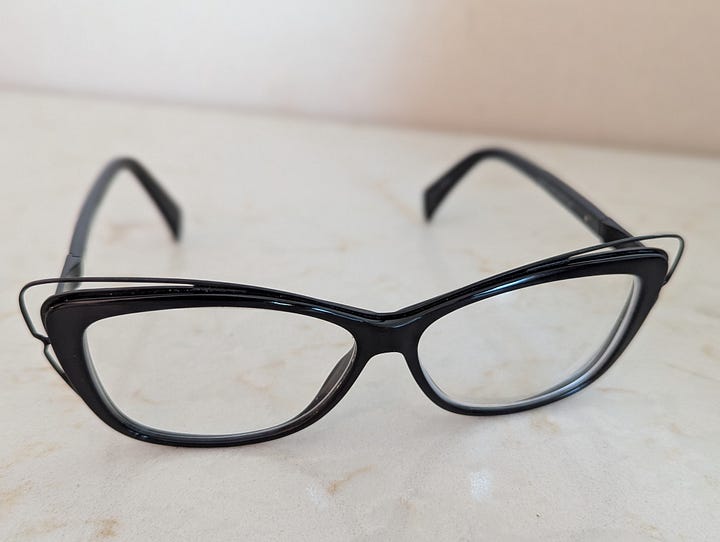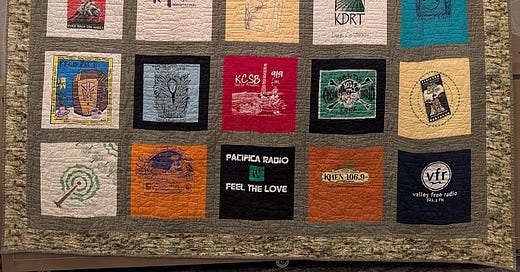My battle gear tells you I'm Generation X
On what we can learn by planting ourselves in the fertile soil of community radio
When I first started dating my husband, I still held that the American tradition of designating “generations” made no sense. He is amongst the last of the Baby Boomers; four years younger, I’m amongst the first of Generation X. But almost immediately, I realized that at least in some ways, we did have generational experiences:
He remembers the Vietnam War; I have memories of a vague feeling that young men were dangerous and angry.
He remembers “Uncle” Walter Cronkite, “the most trusted man in America.” I remember Dan Rather, and I remember more talk about his hair and the Muppet, Dan Rather-not, than any feeling that he was a trusted family member.
He was changed by the Whole Earth Catalog; I was changed by Spin Magazine.1
Hanging with old hippies
I was recently at a radio conference (NFCB, in case you’re interested) and when describing my station KSQD’s ethic, I fell back on shorthand: “Old hippies.” Now, I wasn’t saying that pejoratively—more often than not, I was saying it to a self-described old hippie, who would chuckle and then know exactly what I was talking about.2 Community radio predated the hippie movement,3 but it gained its sustaining power and many of the people who still lead it today during the turbulent 60s and early 70s.
Once I had used that phrase a couple of times, I thought, what are some of the defining characteristics of “old hippies,” and why am I not one? I did know several people in college who subscribed to the hippie ethic, so clearly, Generation X wasn’t immune. But somehow, most of Gen X had received some sort of generational inoculation that led to a different worldview, a different aesthetic, a whole different way of moving through the world.
John Lennon’s glasses
John Lennon, one of the hippie movement’s defining characters, was often photographed wearing sepia-toned glasses. His round frames were a symbol of a working class ethic, definitely part of the hippie movement, and their color enforced the emphasis on natural colors that dominated their fashion early on.
Today’s old hippies were spawned in the later years of the movement toward re-embracing nature: environmentalism, natural foods, and cotton clothing. They had fully formed their character—I think this is important—before Watergate. They were sure they could change the world.
Library lady glasses
I arrived at college in California with the Sophia Loren-style glasses I’d gotten in my conservative town. As soon as I needed new ones, I went to an optical shop to look at frames. The kindly optician showed me several frames that would be “flattering,” much to my exasperation. Finally, I found a way to describe what I wanted: “Show me the frames an old maid librarian would wear, in black, please.” She led me right to what I wanted.
It may be hard to remember since cat eyes are all the rage now, but glasses like this were very out of fashion in the early 80s. Sophia Loren’s frames with their “flattering” low earpieces were all the rage. So my wearing thick, black old-fashioned eyewear was transgressive, to say the least. And I think it said something about Generation X and the battle gear we donned.


Gen X battle gear
Gen Xers were born into a world where the hippie ethic was on the losing side. Peace, love, and freedom had lost out to spandex, gold lamé, and vacuous dance music. Watergate had happened, and by the time us old Gen Xers were in high school, the only liberal president we’d known was flailing. Young Gen X was born into Reagan, but Reagan’s second term was the first election I voted in.
My compatriots and I were more likely to wear war paint than makeup; more likely to don battle gear than simple clothing. For my entire adult life before middle age, I didn’t step outside home—whether my dorm room, an apartment, or even the house I still live in—without thick, back eyeliner. To me, those two lines on my face were part of my identity. I wore black, the color of mourning. During the years that I still cared about what I called fashion, I wore uncomfortable black boots, impenetrable leather jackets, and a challenging scowl on my face.
Even my generational compatriots who didn’t share my punk ethic had rejected any whiff of a natural hippie style. They teased their hair, wore stylized jeans, eschewed practical footwear.
A generational inoculation
The lovely thing about the hippie ethic, and the reason that I call the underlying aesthetic of my station “old hippie,” is its core belief in a peaceful human existence. Hippies believe that humans have the inborn ability to solve the problems we create. They grew up in a time when, as Donald Fagen sang, they had to have fun “in case the Reds pushed the button down.” But they refused to react in fear and instead embraced love and transcendence. They saw their movement stop a war in Vietnam, shame companies into cleaning up their environmental messes, and give women some basic rights.
Gen X was raised on deceit. Watergate colored all of our politics. Where Nixon had lied with the angry scowl of an oil-painted despot, Reagan lied in watercolored Western vistas. Over 60% of my Gen X counterparts voted for Reagan in 1984. But to me, those of us who didn’t define that early Gen X culture. We felt inoculated against caring; when we did care we expressed it as anger, not love. The anti-apartheid movement when I was in college was not a peace movement; it was an economic pressure movement. We had moved on from knowing that we could change human nature to knowing that the best we could do was to keep human nature from expressing its worst tendencies. Hippies protested with love; Gen X protested with cold, hard cash.
My compatriots and I were more likely to wear war paint than makeup; more likely to don battle gear than simple clothing.
The hippie ethic is the fertile soil of community radio
I am too practical-minded ever to have subscribed to a pure hippie ethic. I believe that some people will always have to be forced, by law or by public shame, to do the right thing. But at the same time, I have personally and professionally blossomed once I allowed myself to root in the fertile hippie soil of community radio.
Community radio promotes a deep belief in the value of the creative spirit, the value of open dialogue, and the value of love and tolerance. This may sound like a cliché, but it’s so, so true: Right now, we could also use a heavy dose of creativity, open dialogue, love, and tolerance. Tune into your local community radio today!4
The Babblery can use your support. Please comment on, like, and share this post. Recommend our publication to your friends. Become a paid subscriber. Buy us a coffee. Buy Wally and Tabitha some cat food. Listen to KSQD. Be awesome and carry on.
If you enjoy podcasts, please subscribe to the Babblery on your favorite podcast platform, including Spotify, Amazon, TuneIn, Apple Podcasts, and YouTube.
I suspected he’d notice this one: My husband requests that I point out that he, too was changed by Spin Magazine. But Whole Earth came first for him, and I didn’t learn about it until he showed it to me because that’s how important it was to him!
To be exact, the hippie movement overlapped the Silent Generation and Boomers. So many of the most famous hippies, from Joan Baez to Jerry Garcia, weren’t Boomers. Dolly Parton, Steven Spielberg, and Bill Gates are all Boomers, but not Hippies. The aging Hippies of today who are still active in community radio are on the young end of the Boomer/Hippie overlap.
Or tune into my home station, KSQD, anytime using our nifty mobile app. Catch some waves on The Squid!








I'm Gen X, but I didn't vote for Reagan. I wasn't old enough for his first term. For his second, I was in college. I'm actually not sure I voted at all that year. But I know I have only voted for democrats for president. (I have voted for many republicans otherwise.) I don't think my childhood was shaped by Watergate as much as by Vietnam and 70s sitcoms. I watched Archie Bunker until I couldn't stomach him anymore. George Jefferson didn't bother me because the foils for him actually succeeded. But there were also classics like Happy Days and M.A.S.H., depicting the war. I moved quickly to crime dramas whose main characters had a past in Vietnam (Magnum, MacGyver, etc.). I was in a diverse community, so music went from rap and hip hop to the rock of my older brother (born on the border year, 1965) and the disco in media. Perhaps all that TV I watched carried a hippy ethic. I certainly have some of it, living on the island of Harry Chapin and Billy Joel. And I still believe we can save the world. But I also know many of those old hippies voted for Reagan. They crossed 30 and had families and became more "me" focused.